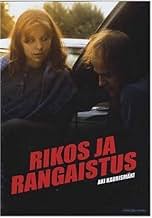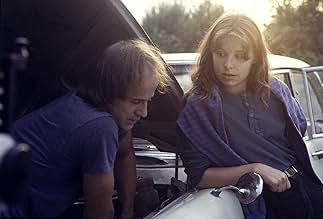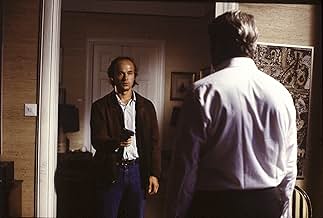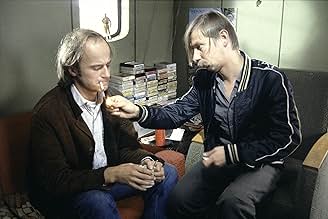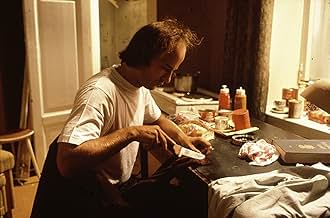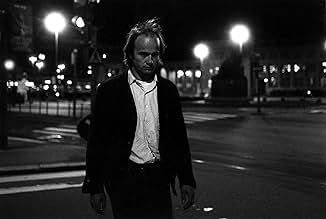VALUTAZIONE IMDb
7,0/10
3431
LA TUA VALUTAZIONE
Un lavoratore di un mattatoio ed ex studente di legge, si vendica dell'uomo che ha ucciso la sua fidanzata in un incidente mordi e fuggi.Un lavoratore di un mattatoio ed ex studente di legge, si vendica dell'uomo che ha ucciso la sua fidanzata in un incidente mordi e fuggi.Un lavoratore di un mattatoio ed ex studente di legge, si vendica dell'uomo che ha ucciso la sua fidanzata in un incidente mordi e fuggi.
- Premi
- 2 vittorie e 1 candidatura in totale
Pedro Hietanen
- Pianist
- (as Pedro's Heavy Gentleman)
Hannu Lemola
- Drummer
- (as Pedro's Heavy Gentleman)
Heljä Angervo-Karttunen
- Opera Singer
- (non citato nei titoli originali)
Juuso Hirvikangas
- Man at the Police Station
- (non citato nei titoli originali)
Jorma Hynninen
- Opera Singer
- (non citato nei titoli originali)
Recensione in evidenza
Just half an hour ago I finished watching the Finnish director's take on Dostoyevsky's wonderful classic novel Crime and Punishment. I knew not to expect a faithful adaptation and in fact, didn't even wish to see one, feeling intrigued at the idea that this literary favourite of mine had been transposed to contemporary Helsinki. As expected, this was really very, very loose as far as literary adaptations go. Yet the core of the novel's concerns were there, so eloquently expressed by its straight-forward and non-symbolic title: CRIME and, as a consequence of the former, PUNISHMENT. And the central concern of all this is not IF the punishment occurs, but HOW and ultimately, WHY it happens.
People seldom smile in Kaurismaki's Helsinki, and have pensive, reflective ways and a deliberateness about them, whether they are police inspectors or pastry shop employees. Rather than the process that brought Antti Rahikainen (Kaurismaki's Raskolnikov) and his conscience to turn himself in to the police, I was struck by the way the movie plays with the spectator's sympathies. Rahikainen inspires sympathy one moment and lack of it the next; then, once again, you develop sympathy followed by antipathy and a desire to see him punished. At least I found it to be the case, and it wasn't that I mentally chastised him for the murder, either. As Rahikainen himself twice said during the course of the movie, you don't really feel like he's killed a man, so much as a principle. The film doesn't go to great lengths to explain what principle that might be, but you can somehow intuit it, and even approve of his actions to some degree - at least in a very abstract sense. And it's not even like the murdered man is ever presented as being repulsive! If there was ever a crime movie more cerebral than this, I would really like to hear about it! One quality I admire in Kaurismaki that's perfectly illustrated by this movie is his use of interior spaces. The way he films rooms with people in them, though it's done in an absolutely subtle, functional and non-showy way, really gives a sense of their context within the world they inhabit and the thoughts and feelings that float around them in said rooms and interiors. The very last frame of the guard shutting the prison door behind Rahikainen after he's been speaking to Eeva (roughly the equivalent of Sonya from Dostoyevsky's novel), really gives a sense that the spaces you inhabit are mostly a reflection of your state of mind, your interior state. After having seen the young murderer in his grotty rented room before, emprisoned within his own musings and guilt, the literal prison he occupies after he turns himself in seems no more restictive of his freedom than his previous mental state. In this sense, Kaurismaki's Crime and Punishment is very similar to the spirit of Dostoyevsky's novel.
People seldom smile in Kaurismaki's Helsinki, and have pensive, reflective ways and a deliberateness about them, whether they are police inspectors or pastry shop employees. Rather than the process that brought Antti Rahikainen (Kaurismaki's Raskolnikov) and his conscience to turn himself in to the police, I was struck by the way the movie plays with the spectator's sympathies. Rahikainen inspires sympathy one moment and lack of it the next; then, once again, you develop sympathy followed by antipathy and a desire to see him punished. At least I found it to be the case, and it wasn't that I mentally chastised him for the murder, either. As Rahikainen himself twice said during the course of the movie, you don't really feel like he's killed a man, so much as a principle. The film doesn't go to great lengths to explain what principle that might be, but you can somehow intuit it, and even approve of his actions to some degree - at least in a very abstract sense. And it's not even like the murdered man is ever presented as being repulsive! If there was ever a crime movie more cerebral than this, I would really like to hear about it! One quality I admire in Kaurismaki that's perfectly illustrated by this movie is his use of interior spaces. The way he films rooms with people in them, though it's done in an absolutely subtle, functional and non-showy way, really gives a sense of their context within the world they inhabit and the thoughts and feelings that float around them in said rooms and interiors. The very last frame of the guard shutting the prison door behind Rahikainen after he's been speaking to Eeva (roughly the equivalent of Sonya from Dostoyevsky's novel), really gives a sense that the spaces you inhabit are mostly a reflection of your state of mind, your interior state. After having seen the young murderer in his grotty rented room before, emprisoned within his own musings and guilt, the literal prison he occupies after he turns himself in seems no more restictive of his freedom than his previous mental state. In this sense, Kaurismaki's Crime and Punishment is very similar to the spirit of Dostoyevsky's novel.
- Asa_Nisi_Masa2
- 7 gen 2007
- Permalink
Trama
Lo sapevi?
- QuizAki Kaurismäki's narrative directorial debut. He chose this project after reading François Truffaut's interview with Alfred Hitchcock, where Hitchcock claimed Crime and Punishment was the one book he would never adapt, because "it would be too difficult." Kaurismäki later admitted it was too difficult.
- Citazioni
Antti Rahikainen: [to Eeva Laakso] I'll tell you something. The man I killed is not important. I killed a louse, and became one myself. The number of lice remained constant. Unless I was one from the very beginning - but that's not important. I wanted to kill a principle, not a man.
- ConnessioniFeatured in Selección TCM: Aki Kaurismaki (2012)
- Colonne sonoreCadillac
Written by Kim Brown, Denys Gibson, Ian Mallet, Stuart Graham Johnson and Vince Taylor
Performed by The Renegades
I più visti
Accedi per valutare e creare un elenco di titoli salvati per ottenere consigli personalizzati
- How long is Crime and Punishment?Powered by Alexa
Dettagli
Botteghino
- Budget
- 1.726.378 FIM (previsto)
Contribuisci a questa pagina
Suggerisci una modifica o aggiungi i contenuti mancanti

Divario superiore
By what name was Delitto e castigo (1983) officially released in India in English?
Rispondi





